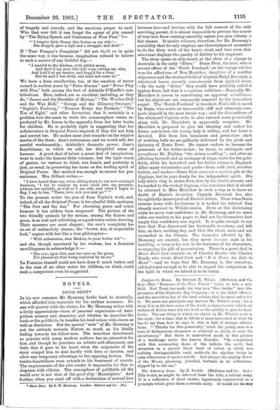NOVELS.
DENIS DENT.*
IN his new romance Mr. Hornung harks back to Australia, which afforded him materials for his earliest successes. No one will quarrel with the choice, for Mr. Hornung writes with a lively appreciation—born of personal experience—of Anti- podean scenery and character, and whether he describes the bush or the goldfields, he handles his local colour with charm as well- as discretion. But the special "note" of Mr. Hornung is not his attitude towards Nature so muoh as his kindly feeling towards his fellow-men. The merciless detachment so popular with many modern authors has no attraction for him, and though he practises an artistic self-effacement, one feels that it goes to his heart when the exigencies of the story compel him to deal hardly with hero or heroine, and allow any temporary advantage to the opposing faction. This tender-heartedness even extends to his treatment of rascals. The requirements of the plot render it impossible for him to dispense with villains. The atmosphere of goldfields all the world over is not that of the good ship 'Mantelpiece.' And further, when you start off with a declaration of mutual love • Denis Dent. By E.W.- Hornung. London : Inbister and Co. [6a.]
between hero and heroine, with the full consent of the only surviving parent, it is almost impossible to prevent the course of true love from running smoothly unless you give villainy a fair chance. It speaks volumes, therefore, for Mr. Hornung's amiability that he only employs one thoroughpaced scoundrel to do the dirty work of the hero's rival, and that even this miscreant displays the quality of fidelity to his employer.
The story opens on ship-board, at the close of a voyage to Australia in the early "fifties." Denis Dent, the hero, who is second officer of the North Foreland,' on the voyage out has won the affections of Nan Merridew, daughter of a wealthy shipowner and the destined bride of Captain Ralph Devcnish, a whiskered bravo, recently convalescent from typhoid fever. —In the early "fifties " they would have probably called it typhus fever, but that is a captious criticism.—Naturally Mr. Merridew is averse to sanctioning an apparent mesalliance, but his objections are summarily removed by the immediate sequel. The 'North Foreland' is wrecked; Nan's life is saved by Denis, who scales an inaccessible cliff and otherwise com- ports himself in the most heroic way ; and the discomfiture of the whiskered Captain (who is also rescued more prosaically along with Mr. Merridew) is apparently complete. Mr. Merridew is prepared to give his blessing and endow his future son-in-law, the young lady is willing, and her lover is devoted. But from this imminent and premature clash of wedding bells we are gallantly delivered by the pride and Quixotry of Denis Dent. He cannot endure to become the pensioner of his father-in-law ; he hears, to anticipate and paraphrase Mr. Kipling, "the mines a-calling"; and after•an affecting farewell and an exchange of rings, starts for the gold- fields, while his betrothed and her father return to England. After many vicissitudes and perils—from cold steel, revolver bullets, and snakes—Denis Dent amasses a modest pile at the diggings, but he pays dearly for his independent spirit. His lady-love's ring is stolen from him by his rival's servant, and forwarded to the wicked Captain, who contrives that it should be returned to Miss Merridew in such a way as to leave no doubt of Denis's desertion. Captain Devenish has also thoughtfully intercepted all Denis's letters. Thus when Denis returns home with his fortune it is to find his beloved Nan already married to Whiskerandos. Even at this distressing crisis we never lost confidence in Mr. Hornung, and we mast refer our readers to his pages to find out for themselves how amply that confidence was repaid. It is quite enough to say here that Nan discovered her husband's treachery, and left him, on their wedding day, and that the rivals meet and are reconciled in the Crimea. The formulas affected by Mr. Hornung are ancient, but they never become stale in his handling, so keen is his zest in the fortunes of his characters, so engaging his gift of presentation. There is a great deal in Denis Dent that reminds us of Charles Reade—the Charles Reade who wrote Hard Cash and " It is Never too Late to Mend " —and we hope that Mr. Hornung is, like ourselves, old-fashioned enough to be able to regard the comparison ,in the light in which we intend it to be taken.






































 Previous page
Previous page